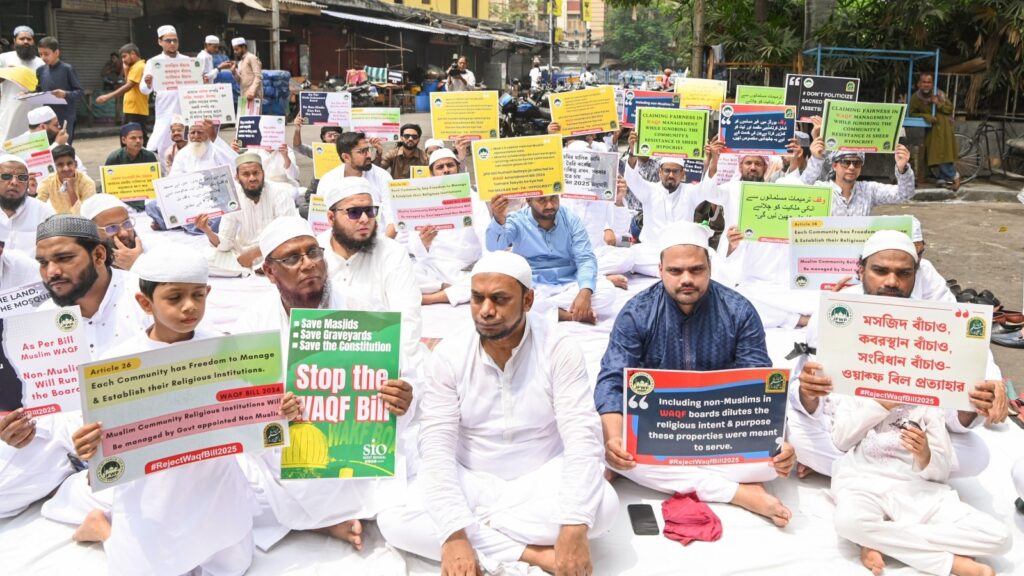The rightist BJP riding on the back of its so-called secular allies, JDU and TDP, managed to get its much-hyped Waqf Bill adopted by the Lok Sabha on April 2. With this, the Narendra Modi government has moved several steps forward in not only taking over the centuries-old Waqf management from Muslims, but it has also succeeded in its avowed mission to erase the identity of the Muslims.
The saffron government has had in the past taken many steps detrimental to Muslim interests. However, the latest move is a direct and one of the hardest attacks on their identity, which forces them to be subservient to Hindu majoritarianism. Muslims asserting their identity and rights have long been unacceptable to RSS. Besides dissipating their identity, the Bill is also part of the greater design to force the poor Muslims (pasmanda) to come back under the fold of Hinduism (ghar wapasi).
The RSS strongly nurses the view that upper caste and rich Muslims are the backbone of the Muslim community, who have been primarily responsible for division of India and creation of Pakistan. And that, if their political and economic authorities are curbed, the common and poor Muslims would not prove to be a major challenge to the Sangh’s authority and diktat. RSS leaders are also aware of the visceral reality that 20 crore odd Muslims cannot be forced out of India, and obviously the best option for it is to coerce them into following the Sangh diktat.
In this context, Union home minister Amit Shah’s rhetoric in Parliament ought to be paid serious attention to: he has claimed that the new amended bill will help poor Muslims. What made Shah discriminate among the Muslims and divide the already beleaguered community on caste and class lines? The leaders of RSS and BJP never use the word poor to describe the Hindus, who form the bulk of the country’s poor. But suddenly they have been talking about ‘empowerment of poor Muslims’. This is purely a move to isolate the rich and upper caste Muslims from the masses of the common and poor Muslims.
Waqf tradition in India can be traced back to the Delhi Sultanate period in the 13th century. India has one of the largest numbers of waqf assets in the world, including over 870,000 properties spanning more than 900,000 hectares, with an estimated value of about $14.2 billion. Domestically, only the military and railways control more land. In Islamic tradition, a waqf is a charitable or religious donation made by Muslims for the benefit of the community. The owner of the property is Khuda (God) and the board simply manages the properties. Properties categorized as waqf, which typically involve mosques, schools, orphanages or hospitals, cannot be sold or used for other purposes.
From the beginning, the waqf properties have been under the control of the rich and upper caste Muslims. The poor, or Muslims belonging to the pasmanda section, do not have any say in running the affairs of the waqf councils or boards. A word from Amit Shah that poor Muslims would be the major beneficiaries of the amendment would naturally have a magical impact on ordinary Muslims at a time when the Dalits and poor Hindus are striving for their share in the state power.
The Bill aims at making sweeping changes to the decades-old Waqf Act, which governs vast tracts of properties run and managed by Muslims in the country. To put the poor Muslims against the rich and upper caste Muslims, Shah tactfully tried to dispel the impression prevailing amongst the common Muslims that non-Muslims will be inducted as members of the Waqf Board. To reassure common Muslims, Shah criticised opposition leaders for “spreading misconceptions” about the Bill; the legislation does not interfere with the religious practices of any community. Interestingly he reiterated that the bill aims to ensure transparency and prevent mismanagement of Waqf properties.
The Waqf (Amendment) Bill, proposed by Prime Minister Narendra Modi’s BJP, proposes more than 40 changes to the 1995 Waqf Act aimed at shifting the management of waqf properties from the boards to state governments. Reacting to the move, the All India Muslim Personal Law Board, which is entrusted to safeguard Islamic law in the country, said the bill could weaken waqf properties and their management.
“I think this bill has been brought with an intention to destroy the waqf board, not to improve it. The new law is very weak and aimed at attacking waqf properties,” said board member Malik Mohtasim Khan. The Muslims are apprehensive of the government as in future the board would be managed by the government officials. It is certain that even a Muslim bureaucrat would not muster up courage to go against the wishes of his political master. Khan is absolutely right in saying; “They want to make a waqf law which is free from the influence of Muslims. I feel that their main aim is to make Muslims a second-class citizen.”
Notwithstanding Amit Shah’s frantic efforts to diffuse the scepticism that grips the Muslim community, the fact remains that socio-economic discrimination, cultural and religious repression along with periodic targeted violence that they have had to undergo during eleven years of Modi rule would further aggravate. Majoritarian politics will further intensify. Muslims are correct in saying: “They want to weaken Muslims’ rights in India. The existing government has created such an atmosphere that there is no respect for parliamentary values and judicial values are also getting diluted. Today the Muslim community is being pushed to the margins. This is the reality.”
The manner in which Modi government is moving ahead is really quite disturbing, since it’s a coalition government with so-called secular allies such the JDU and the TDP, which do not share the BJP’s vicious Hindutva agenda. However, clearly they have caved to Modi-Shah’s political will. No doubt, adoption of the bill is an “unfortunate development,” it would further vitiate social ambience and give rise to communal violence. What is worse, Modi and his deputy Amit Shah did not bother discussing the bill with the Muslims, while they deliberated it with non-players, those who have no religious or political relevance. This move of RSS and BJP in fact turns the people of their real intentions.
The sight of AIMIM leader Asaduddin Owaisi tearing a copy of the Waqf Amendment Bill in the Lok Sabha must not be ignored by either the BJP, or even the secular opposition. Owaisi echoed the sentiment of the Muslims when he underlined that the Bill was aimed at making Muslims “second-class citizens”. He said: “Yeh Bill ka maqsad sirf muslamanon ko jaleel aur ruswa karna haa, musalmanon ko dusre darje ka shehri banane ka inka maksad hai (The objective of this bill is to insult and humiliate Muslims and make Muslims second-class citizens).” He said the BJP is looking to spark clashes in the country in the name of temples and mosques.
On the Modi government raising the issue of encroachment on Waqf properties, Owaisi said: “If this is an issue, why did the government in 2024 withdraw the Waqf Properties (Eviction of Unauthorised Occupants) Bill that was introduced by a minister in 2014?” According to him, Modi and RSS- BJP were targeting the “Shariat, mosques and madrasas”.
Amit Shah is equivocating when he said that “fear is being spread” that the Waqf bill interferes in religious matters and that it was a false narrative driven by vote bank politics. On the contrary, he was trying to communalise the Hindu society and rope in those Hindus who so far had kept away from his communal politics. If what he says is to be believed that the “Bill aims to address inefficiencies in the existing Waqf Act by introducing administrative reforms and technology-driven improvements”, then what was the need for ushering in such drastic change of the existing law? It’s obvious as daylight that the changes would make many Waqf properties rather vulnerable to legal challenges over ownership rights and other issues. (IPA Service)

 Will Delhi Police Actually Act Against Riot Accused Delhi Law Minister
Will Delhi Police Actually Act Against Riot Accused Delhi Law Minister 